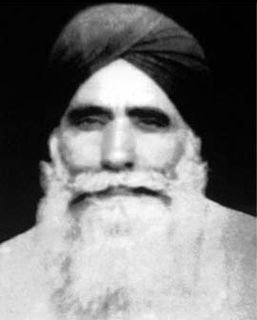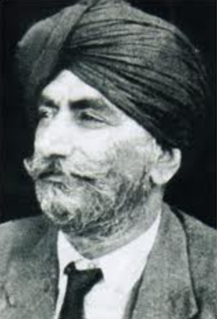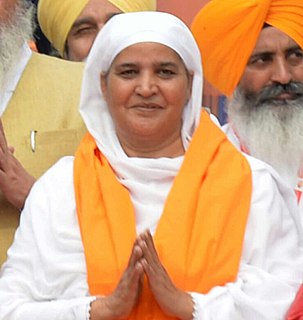
Panth Rattan Shiri Gurcharan Singh Tohra was a president of Shiromani Gurdwara Parbandhak Committee (SGPC), a Sikh body in charge of controlling Gurdwara. He died of a heart attack in New Delhi on 1 April 2004 at the age of 79. He remained the head of the SGPC for a record 27 years, and was one of the most influential and controversial Sikh leaders of the 20th century.

The Punjabi Suba movement was a long-drawn political agitation, launched by the Sikhs, demanding the creation of a Punjabi Suba, or Punjabi-speaking state, in the post-independence Indian state of East Punjab. Led by the Akali Dal, it resulted in the formation of the state of Punjab. The state of Haryana and the Union Territory of Chandigarh were also created and some Pahari-majority parts of the East Punjab were also merged with Himachal Pradesh following the movement.

The Shiromani Gurdwara Parbandhak Committee is an organization in India responsible for the management of gurdwaras, Sikh places of worship in three states of Punjab, Haryana, and Himachal Pradesh and union territory of Chandigarh. SGPC also administers Darbar Sahib in Amritsar.

Sardar Hukam Singh was an Indian politician and the third Speaker of the Lok Sabha from 1962 to 1967. He was also governor of Rajasthan from 1967 to 1972.

Teja Singh Akarpuri was an Indian and Sikh politician who served as the 11th Jathedar of Akal Takht from 1921 to 1923 and 1926 to 1930. He was the First MP from Gurdaspur constituency In Lok Sabha from 1952 to 1957 and was succeeded by Diwan Chand Sharma

Lachhman Singh Gill was an Indian politician who served as the 12th Chief Minister of Punjab. He remained in this post from 25 November 1967 to 22 August 1968. He was a member of Shiromani Akali Dal(SAD), a Sikh-centered regional political party in Punjab.

Bibi Jagir Kaur is the first woman to be elected for the third time as the president of the Shiromani Gurdwara Prabandhak Committee (SGPC), an organisation that manages historic Sikh shrines and some educational institutions in the Indian states of Punjab, Haryana, Himachal Pradesh and the Union Territory of Chandigarh.
Harjinder Singh Dilgeer He is the author who has written Complete History of the Sikhs and has translated Guru Granth Sahib in English and has published NEW MAHAN KOSH Encyclopedia of Sikh literature and Punjab & Sikh History {3 of the 4 volumes of the NEW Mahan Kosh have been published in March 2021. He has written in detail about the concept and the history of Akal Takht Sahib, Sikh culture, Shiromani Akali Dal, the history of Anandpur Sahib, and Kiratpur Sahib, Dictionary of Sikh Philosophy etc. The Sikh Reference Book is his magnum opus. 'The Sikh Reference Book' is an encyclopaedia consisting of more than 2400 biographies, complete chronology of Sikh history, 400 concepts of Sikh philosophy as well more than 800 Sikh shrines. He has produced a Sikh Encyclopedia CD-ROM. His latest books are Encyclopedia of Jalandhar (English), Banda Singh Bahadur, Sikh Twareekh in five volumes, Sikh History in ten volumes ; and English translations of Nitnaym and Sukhmani Sahib.. His latest work is English translation of Guru Granth Sahib, in seven volumes and NEW MAHAN KOSH, published in March 2021.
The Akali movement, also called the Gurdwara Reform Movement, was a campaign to bring reform in the gurdwaras in India during the early 1920s. The movement led to the introduction of the Sikh Gurdwara Bill in 1925, which placed all the historical Sikh shrines in India under the control of Shiromani Gurdwara Parbandhak Committee (SGPC).
Kartar Singh Jhabbar was a Sikh leader known for his role in the Gurdwara Reform Movement of the 1920s.
Giani Gurbachan Singh (born on 6 April 1948 at Chakk Baja in Muktsar, Punjab, was the 30th Jathedar of Akal Takht.

The Jathedar of the Akal Takht, is the appointed head of the Akal Takht and the Sikhs of the world. Sikh clergy consists of five Jathedars, one each from five Takhts.

Giani Partap Singh was a Sikh priest and Panjabi writer. He served as the first acting Jathedar of Akal Takht from 19 December 1937 to 1948 and 19th Jathedar of Akal Takht from 1952 to 15 February 1955.

Jagdev Singh Talwandi was an Indian politician. He was elected to the Lok Sabha in 1978 as a member of the Shiromani Akali Dal (SAD), a Sikh-centered regional political party. Talwandi was elected SAD president in 1978 and 1988. He became the President of the Shiromani Gurdwara Parbandhak Committee (SGPC) in 2000. He was elected to the Punjab Vidhan Sabha thrice in 1967, 1969, and 1972, and was inducted as a Minister of State for Development and Animal Husbandry in the Gurnam Singh Ministry and the Minister of State for Jails, Sports and Transport in the Parkash Singh Badal government. He represented Punjab in the Rajya Sabha from 1980 to 1986.

Jathedar Udham Singh Nagoke was a freedom fighter, Jathedar of Akal Takht and member of Rajya Sabha.
Mehtab Singh, Sardar Bahadur (1879–1938) was a lawyer, freedom fighter and legislator who became closely associated with Gurudwara Reform movement and later became the president of the Shiromani Gurdwara Prabandhak Committee.

Mohan Singh Nagoke (1898-1969) was a Politician from Punjab, Freedom fighter and former Jathedar of Akal Takhat Sahib.

Ishar Singh Majhail (1901-1977) was a politician and legislator from Punjab.

Bawa Harkrishan Singh was a politician from Punjab and freedom fighter.

Gopal Singh Qaumi was an active member of the Gurdwara Reform Movement. He served as the President of the Shiromani Gurdwara Prabandhak Committee just for one day, until now the shortest serving President. He remained in confinement for 13 years during the freedom struggle. He took an active part in the Simon Commission boycott, the Quit India movement, Guru Ka Bagh Morcha and went for 64 days hunger strike in jail. He was awarded the Tamra Patra award by the Government of India on 15 August 1975.














